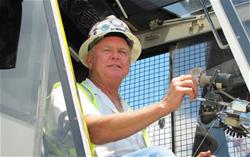CCO Operator Profiles - Mark F. Wessel
 Mark Wessel has been operating cranes since 1968 and has been CCO certified on all types of mobile cranes since 1997. He first started with IUOE Local 181 right out of high school; at that time there was no formal training available, so most of his learning was on the job, sitting in for older operators who could instruct him as he went. By the time he was 21 he was operating cranes nearly full time.
Mark Wessel has been operating cranes since 1968 and has been CCO certified on all types of mobile cranes since 1997. He first started with IUOE Local 181 right out of high school; at that time there was no formal training available, so most of his learning was on the job, sitting in for older operators who could instruct him as he went. By the time he was 21 he was operating cranes nearly full time.
In the early ’90s, he helped Local 181 develop its own certification test, and he taught some of the exam preparation classes. But when CCO certification became available, they abandoned their own program and adopted NCCCO’s. “Obtaining my CCO crane operator certification has helped me do my job better because I am surer of the laws and rules of safe crane operation,” Mark told NCCCO. “Now I know there is no question about the proper and safe way to operate a crane. I have always prided myself on being a very safe operator, but all the study guides I read before testing gave me a deeper knowledge of safety.”
He continues to support NCCCO’s efforts. “NCCCO has taken great effort to provide complete coverage of all aspects of safe crane operation. The whole job site is a safer and calmer place to work,” he says. “The ground crews and supervision are much more confident in my abilities when I show up on a job as a CCO certified crane operator.”
Mark has worked in numerous power plants along the Ohio River, automotive factories, refineries, chemical plants, steel foundries, and interstate highway bridges, pouring concrete, hanging iron, driving piles, and other typical crane work. Earning his CCO certification prepared him to participate in a number of critical tandem lifts, such as moving large vessels at energy plants. He’s even operated a Kroll 10000, one of the largest tower cranes in the world, to help assemble prefabricated pieces of structured iron.
Mark sees ongoing maintenance as the biggest challenge in operating cranes today. He sometimes feels pressure to keep working even when there are obvious problems with the crane, so he sees the need for a national certification program for crane inspectors, such as that being developed by NCCCO in association with the Crane Certification Association of America (CCAA). He feels so strongly about this that he’s applied to help on the Crane Inspector Task Force that will develop this new certification program, and he may get into crane inspection when he retires from operating cranes.